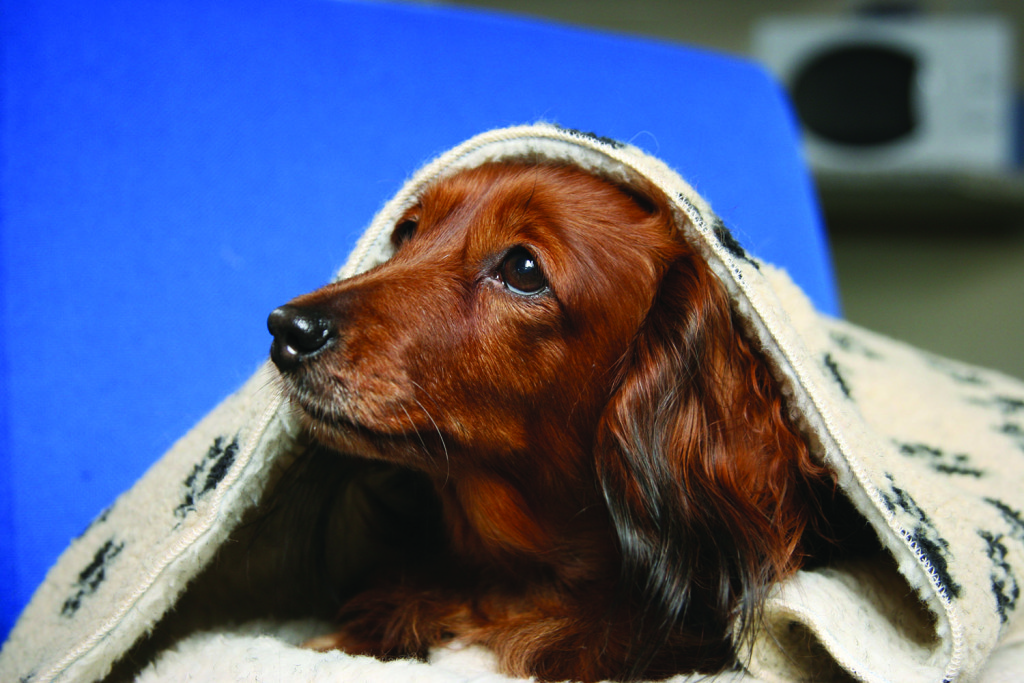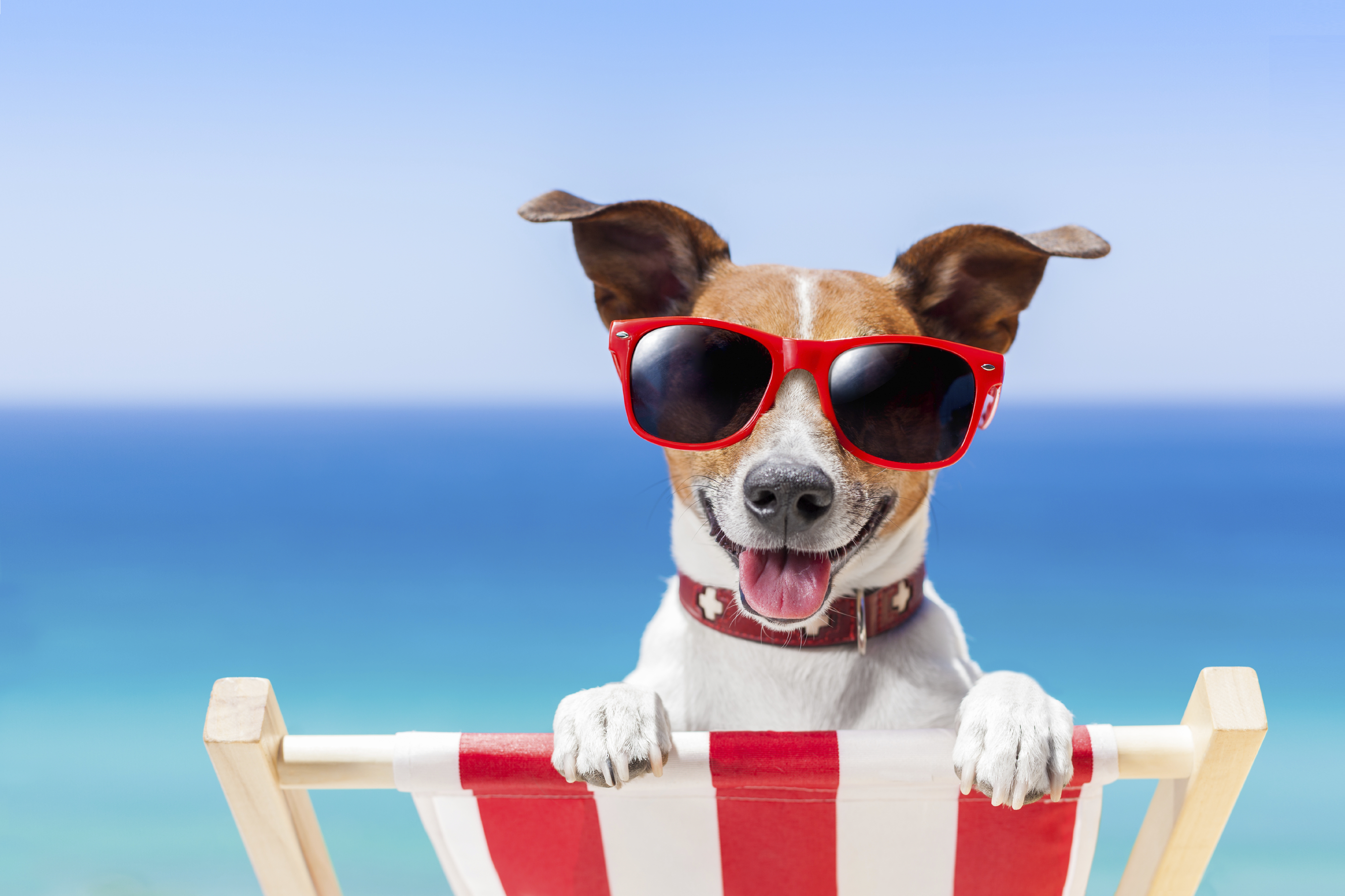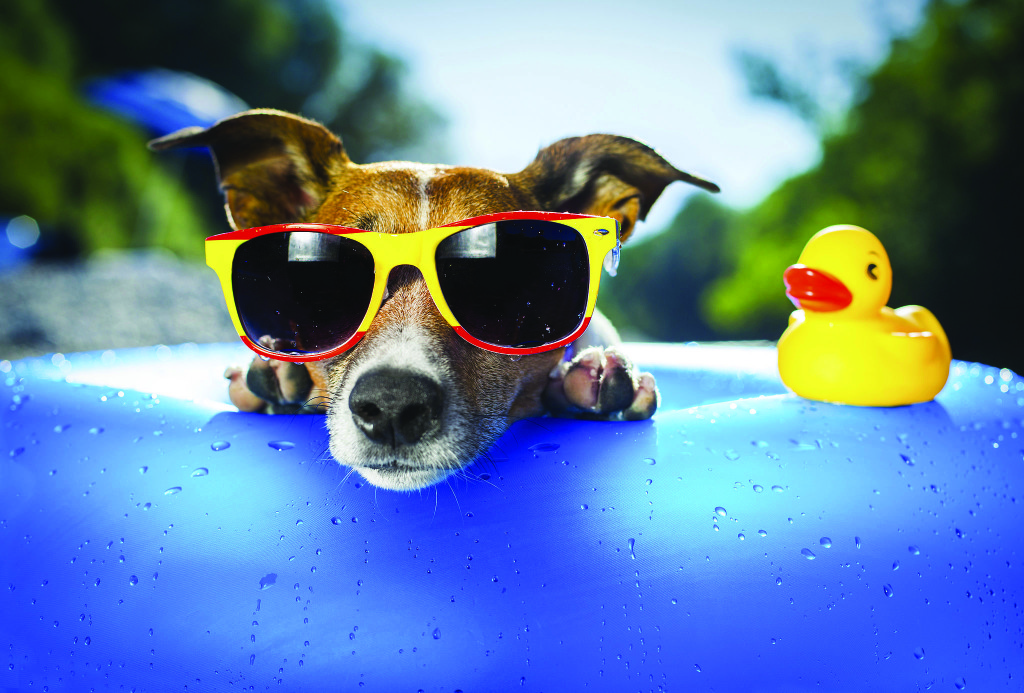Ensure pet summer safety by following these tips.
With summer approaching quickly, the most important thing to remember is that the scorching heat can cause problems for both you and your pets. Please make sure that there is a place for your pets to go to get out of the heat, and that there is always plenty of fresh cool water available all day for them to drink.
Did You Know That Dogs Don’t Sweat?
Did you know that dogs don’t sweat! Actually, dogs eliminate heat in their bodies by panting rather than sweating like we do. While heavy panting can be a sign of many things including stress, excitement, and even pain, it can also be a sign that your dog is overheated.
If you notice your pooch is panting excessively, it could be a sign he (or she) isn’t cool enough, even if he is indoor only. Be particularly mindful of this with very young or very old dogs, and the “smooshy” faced breeds like pugs, Boston terriers and bulldogs.
Avoid Overheating
To reduce the chances of overheating, we recommend that you only take your dogs outside for exercise walks during the coolest parts of the day, like early morning and later in the evening. Quick potty walks during the heat of the day are fine, but watch them closely for any signs of distress related to the heat. A good rule of thumb is that if you feel hot your pets likely does too. Remember, they are also wearing a fur coat!
Protect the Paw Pads
Something else to keep in mind about the summer heat is that dogs don’t wear shoes. The asphalt can heat up to very high temperatures, causing burns to your dog’s sensitive paw pads. This can result in blistering, pain, limping, and even peeling off of the outer layers of the paw pads.
Keeping your dog off the hot surfaces or having her wear protective booties for her walks will help keep her paws from being burned.
Heat and Hot Cars
While it is obvious to most of us to NEVER, EVER leave a dog in a hot car, it is something that happens every summer. Even with the windows down, the car can heat up to temperatures way above the outside readings.
Some of the signs of overheating or heat exhaustion include:
heavy panting
dry or bright red gums
thick drool
vomiting
diarrhea
wobbly legs
What to Do for Overheating
Should you notice any of the common signs of overheating, please don’t place your dog in ice-cold water or put alcohol on him in an effort to cool him down rapidly, because this can put his body into shock.
It is important to bring down a dog’s body temperatures slowly. We recommend you move him to a cool place and drape a damp, cool towel over his body. You can re-wet the cloth frequently with cool water, and get him to your vet as soon as you possibly can.
A dog’s normal temperature is between 100° and 103°F, so once he hits 104°F, he is starting to get into dangerous territory (106°F or higher can be fatal).
Cats Get Overheated, Too
Remember that cats can get overheated too. Signs of heat stroke in cats can be profound lethargy, panting, drooling, a fever, vomiting and collapse. If you think your cat may be showing signs of overheating or heat stroke, please get her to the vet ASAP. Heat stroke can cause permanent organ damage and death in a very short period of time, even minutes.
Here are some quick tips for going to the beach, pool, or lake with your pet:
For dogs who love to swim, it’s a good idea to have them wear a lifejacket if they will be unattended. This is especially important if they are likely to be swimming for long periods of time, can’t get out of the water easily, or just as a safety precaution.
Make sure there are plenty of shady spots for your dog to rest out of the water. Dogs can also get sunburned on areas where they have thin hair coat and exposed skin. You can use sunscreen on your dog, but it may be difficult to apply so be sure to have shady areas for your dog to be able to get out of the sun.
Be aware of currents and rip tides in the ocean.
Make sure you have plenty of fresh water for your dog to drink while at the beach, because swallowing salt water in the ocean can lead to vomiting, diarrhea, anorexia, dehydration, and serious medical complications.
Rinse off your dog if he has been in salt water or chlorine to limit skin irritation and rashes. To help prevent ear infections from water getting into his ears, clean them after every single time he has been swimming.
Pesky Parasite Protection
While we all LOVE the warm weather that the spring and summer bring, so do the fleas and ticks. For comprehensive pet summer safety, however, we absolutely recommend year-round protection from fleas in the Southeast. Fleas and ticks both carry lots of nasty and serious diseases, not to mention they are just totally gross critters! Be sure you are keeping your pets protected against these pesky parasites.
There are many options for flea and tick prevention including collars, topical products, and now there are even oral products that can be given to ward off the jumping, biting, disease-carrying little critters that love to make a meal out of you and your pets. Be sure to ask your veterinarian for a recommendation for the best options for your pet’s lifestyle, risk, and tolerance when using the preventative products.
Stay Far Away from Fireworks
Fireworks are an exciting part of summer for many people; however, they are frightening and dangerous for many pets. Fireworks pose a burn risk for unsuspecting pets if they get too close or step on them soon after they are started. Always use caution with any fireworks or sparklers when around pets and children.
While burns and injuries from fireworks are rare in pets, emotional and physical trauma from the noise of the fireworks is very common. The loud noises and vibration produced by the sound can elicit sheer panic, taking the form of trembling, hiding, and nervous excitement in your pet. This can quickly progress to a devastating situation where your pet can be injured trying to “escape” the loud and terrifying situation.
There are also many pets who become so scared that they run away from their homes and get injured while away or never return. If your pet has any form of stress, anxiety, or discomfort during firework season, please speak to your veterinarian about recommendations to help them alleviate the emotional distress and reduce the risk of injury to your pet from fireworks.

Centre manager Julie Stone’s dachshund Fable, modelling for cover of the 2006 fireworks leaflet.
PL/00183 – Lewknor – 3.8.06 – Photographer – Nick Ridley
Dr. Jodi Reed is a Veterinarian with Harmony Animal Hospital in Apex









